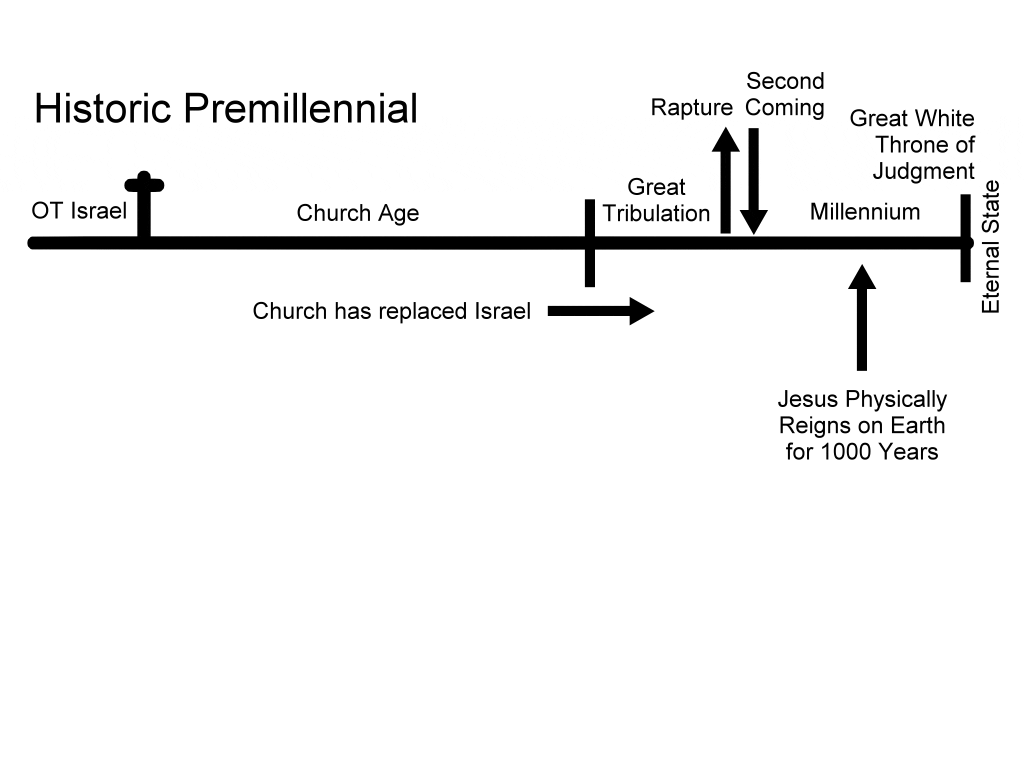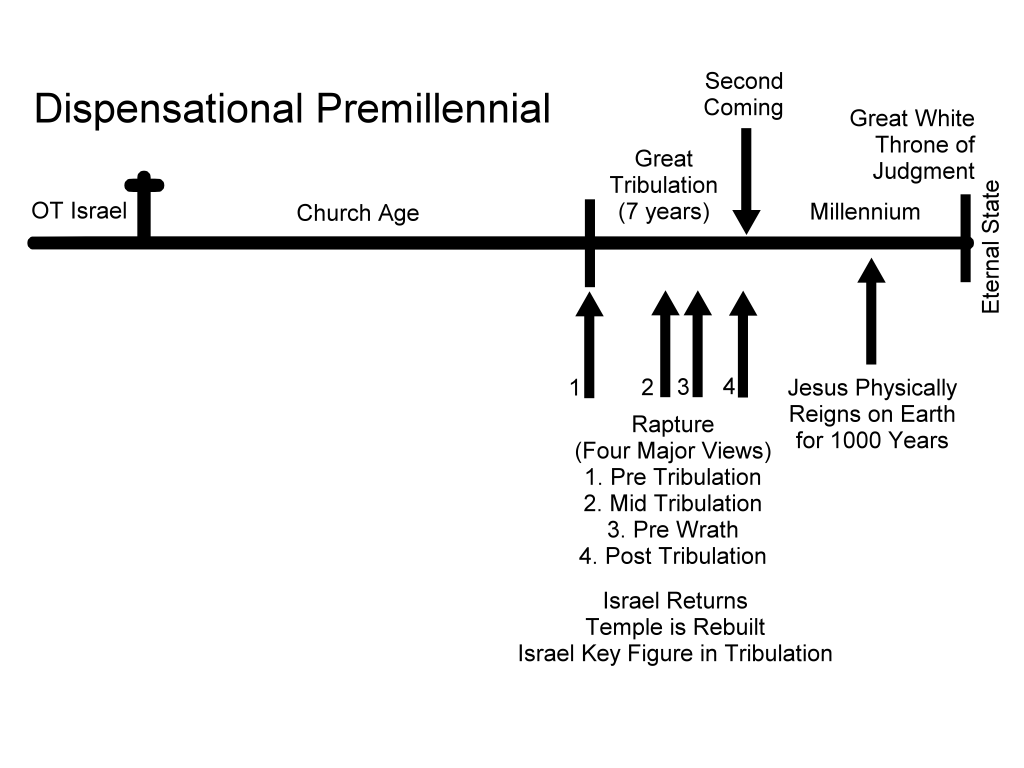Revelation 20:6 "Blessed and holy is the one who has a part in the first resurrection; over these the second death has no power, but they will be priests of God and of Christ and will reign with Him for a thousand years."
Introduction:
For the past few days we have been exploring various interpretations of Revelation 20:1-10 and the particular points that aim to describe the Millennial Kingdom or 1,000 years in that same chapter. We have so far looked specifically at Amillennialism and Postmillennialism, noting their strengths and weaknesses and have offered Premillennial response to each. In today’s post we turn our attention to Premillennialism itself and must say up front that in the realm of Premillennial interpretation there exists two basic versions that in some ways could be considered almost two distinct viewpoints in their own right.
So what are the two versions of Premillennialism?
The older of the viewpoints is deemed “classical” or “historic” premillennialism because of it having existed since the early days of the church. The more recent of the two is called: “Dispensational Premillennialism”, due to its particular approach to dividing up history into epochs or dispensations and distinguishing between Israel and the church.1 To aid the reader in distinguishing between these two versions of Premillennial thought, the following comparative charts can be noted:
Historic Premillennialism Pictured2

Dispensation Premillennialism Pictured3

Similarities between Classical and Dispensational Premillennialism
Dr. Timothy Paul Jones nicely summarizes the similarities between historic/classical premillennialism and dispensational premillennialism:4
1. The Biblical writers expected a future physical kingdom
2. Jesus will reign personally over the whole earth, and no creature will ever be prey or predator ever again
3. Before Jesus returns, demonic deceptions will multiply, and spiritual conditions throughout the world will worsen (1 Timothy 4:1-5; 2 Timothy 3:1-9)
Two other similarities can be mentioned in addition to Dr. Jones' listing:
4. The term “1,000” is taken to refer to a literal earthly stage of Christ’s Kingdom. Historic Premillennialists will by and large focus more on the earthly kingdom aspect, without making the number necessarily literal (although most would say it is). Dispensational Premillennialists will assert both the literal earthly aspect of Jesus’ reign and that it will definitely be 1,000 years in duration.
5. Revelation 20 in its entirety is speaking of a future earthly reign of Jesus Christ on this world.
Differences between Historic and Dispensational Premillennialism
For a long time this author had held to what was a Historic Premillennial viewpoint. By and large there are a few tenets of that system this blogger still find appealing. However there are a couple of aspects of the Dispensational Premillennial viewpoint that this blogger believes to be in line with the scriptures. In having read books, listened to lectures and talked to various people over the years, the following differences can be noted.
1. Historic Premillennialism believes the church will go through the tribulation – i.e a posttribulational viewpoint.
Dispensational Premillennialism would differ in saying that the church will be raptured before the tribulation – i.e a pretribulation viewpoint.
2. Historic Premillennialists such as Charles Spurgeon believed the Gospel would continue to increase in study proclamation until Christ returns to set up His 1,000 year reign.
Dispensational Premillennialism believes the Gospel will be proclaimed, but more in a start, stop, start fashion. With the church being rapture out before the tribulation, the 144,000 will pick up the task and multitudes of people (not the church) will get saved out of the tribulation, having died for their faith in the tribulation. (compare Revelation 7,14).
3. Historic Premillennialists would say that the church has replaced Israel or is the new Israel.
Dispensational Premillennialists would make the distinction between the two.
4. Historic Premillennialists tend to read the Old Testament prophecies in light of the New Testament.
Dispensational Premillennialists tend to view the unfolding of Bible Prophecy as deriving from God’s promises to Abraham, David and the New Covenant. Both viewpoints of course make Jesus Christ and His act of fulfilling God’s promises and prophecies central to their understanding of end time events.
Where this author stands on the subject of Premillennialism
I'm certain by now for those readers who have been tracking this most recent series of posts that I am a Premillennialist in my approach to Revelation 20:1-10. The question is, in light of the two positions above, where do I stand? Both positions represent endpoints in the interpretive camp of the Premillennial approach to scripture and Revelation 20. There are in my mind at least two legitimate observations I find helpful from each version, totalling four points in all in where I stand on the Premillennial issue.
1. I find the Historic Premillennial idea of Jesus' Kingdom being an already/not yet Kingdom quite helpful in understanding Bible prophecy. To say it is all future is ignoring the statements made by the Apostles regarding all that took place following Jesus' ascension. Clearly He is ruling in some fashion in Heaven. However there is an aspect to Jesus Kingdom that has yet to take place - which I would argue to be the 1,000 year reign spelled out in Revelation 20:1-10.
2. I agree with the Dispensational Premillennial view that we still need to make distinctions between the church and Israel. Unlike my Historic Premillennial friends, I do not think the church has replaced Israel. Two of the main purposes of the Millennium is for God's promises to Israel to be completed and for the church to physical rule with Jesus on His throne. (Romans 11:25-26; Ephesians 2:6-8; Revelation 20:1-6)
3. I agree with the Historic Premillennialists that the New Covenant spoken of in the Old Testament and the New Testament is the same and not two different New Covenants. This is a key point in that the New Covenant promises of which the church is getting a foretaste are directly related to the full New Covenant promises which Israel will be enjoying in the Millennial Kingdom.
4. I agree with the Dispensational Premillennialists that the rapture of the church will preceed the tribulation and thus the church-age saints resurrection will be a "part one" of a two-part resurrection of the righteous, with Israel's resurrection at Christ's second advent concluding that resurrection sequence. Revelation 20:6 notes "blessed and holy is the one who has a part in the first resurrection".
Endnotes:
1. To try to clear up the differences between the two positions, some scholars have deemed the older version of Premillennialism “post-tribulational Premillennialism” due to its view of seeing the church go through the tribulation and viewing the rapture and second coming as one event. The second version of Premillennialism is sometimes termed “pretribulational Premillennialism” and teaches that the church will be raptured before the tribulation and stresses the distinction between the church and Israel. We will for our purposes stick to the titles “historic” and “dispensational” premillennialism.
2. http://www.bibleistrue.com/qna/qna91.htm#historicpremill
3. http://www.bibleistrue.com/qna/qna91.htm#disppremillennial
4. Dr. Timothy Paul Jones. Rose Guide to Endtimes Prophecy. Page 329.
